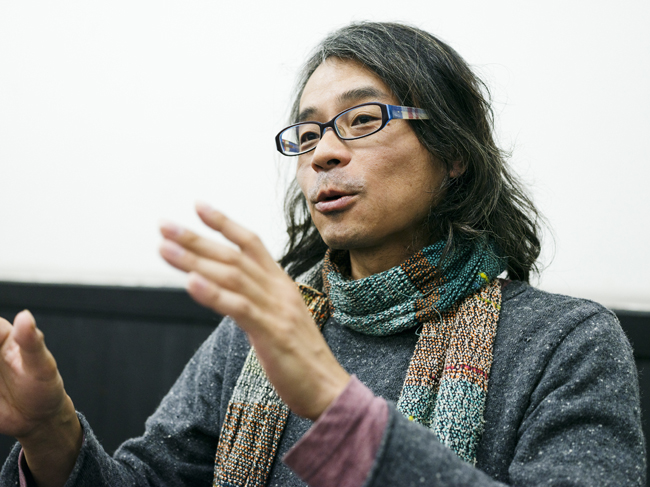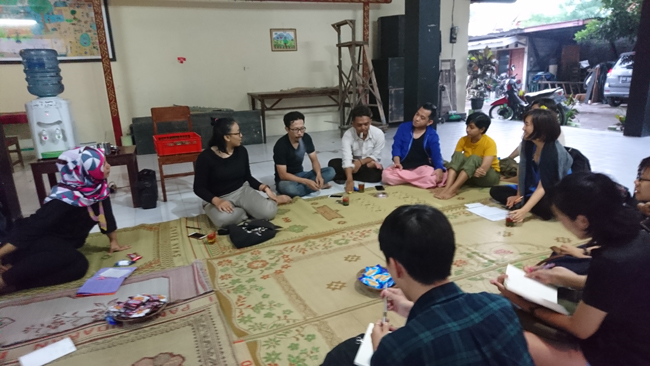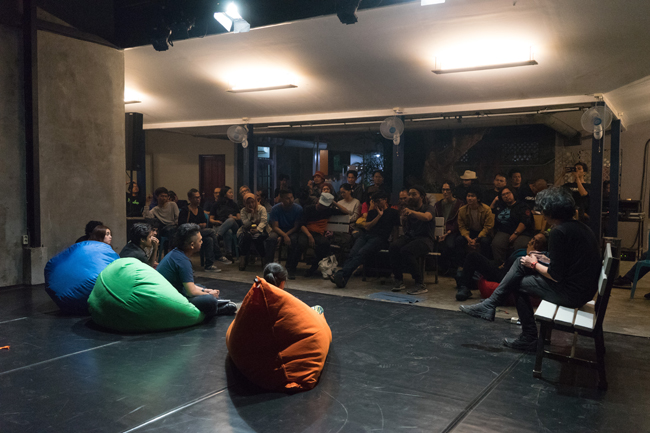The language, religion and nation of Indonesia
Fujiwara: Indonesia is often associated with the traditional performing arts such as Wayang Kulit and Gamelan. How do projects of the BPAF relate to or stand in relation to these traditional performing arts?
Taufik: Of course, we don't reject them. We are willing to embrace anything that is enjoyable. If there is someone among our members who is capable of engaging with the traditional performing arts, we would like to utilise those skills. I personally really like wayang kulit, so I don't wish to distance myself from it.
Fujiwara: So you are not thinking in terms of traditional versus contemporary?
Taufik: For us, "contemporary" is about how we connect with society without being restricted by formalities. So it does not matter whether our work is traditional or not.
Fujiwara: When you create your work, the language used is Indonesian. Is that right?
Taufik: Yes, but there are different regional languages, and we may use them if we go elsewhere.
Fujiwara: Here's a very basic question: is the Indonesian language understood all over Indonesia?
Taufik: Everyone speaks Indonesian as the common language, but people use their respective regional languages in their everyday lives. Even the grammar is very different. Because Indonesian was originally a language used for commerce, it may not feel like our mother tongue.
Fujiwara: We heard that you invited Leow Puay Tin from Malaysia. Did she write in Malay or in Indonesian?
Taufik: Because we are a collective, she wasn't the only one who wrote it. We wrote it together in the Indonesian language.
Fujiwara: Does that mean that her understanding of the Indonesian language allows her to conduct an oral history workshop or create a piece of work?
Taufik: Leow Puay Tin actually used English as well as Malay. The Indonesian language was originally used in the market for commercial trade in the Malay-speaking region, so it is close to Malay, and people can understand each other.

Fujiwara: I see. For someone like myself who has grown up in Japan, a situation where there is no distinct linguistic barrier between yourself and your neighbouring country is very interesting. In Japan, the language barrier itself is considered as the national border, and there is still a strong sense that, inside this border, things are homogeneous. Do you feel a sense of belonging to a nation called Indonesia?
Taufik: People in West Java are called Sundanese. I am a Sundanese myself and speak the Sundanese language, but I am not fanatic about being Sundanese. I don't particularly think about my identity as someone from West Java because I regard myself as a global citizen. Of course, I consider Indonesia as a nation, but I don't think I have such a strong sense of attachment to the country.
Indonesia is a huge country that has many different regions. East Timor have become independent, but there are regions outside Java known as the outer islands. There are ethnic conflicts in different islands, so not everything is equal and peaceful, yet I think there still is a sense of "Indonesia as one nation".
Fujiwara: I think that Islam itself is a very peaceful religion, but I also hear about the rise of Islamic fundamentalism. How do you feel about that?
Taufik: I have a feeling that Islamic fundamentalism has become stronger, particularly in the last ten years or so. It is stronger politically, and we even have a situation where people with power are promoting behaviour that is characteristic of Muslim fundamentalists. We are actually talking right now with performing artists from various islands to see whether we can create something in response to this situation.
Fujiwara: By the way, someone told me the other day about the "darkness of Indonesia". I don't know much about Indonesia yet, but I responded by saying, "I sort of know what you mean. I think I actually like that darkness". Then the person warned me that "you will be swallowed in by that darkness!" It is all rather ambiguous, but do you feel a kind of "darkness" in Indonesia?
Taufik: Why do you think Indonesia is dark?
Fujiwara: I don't know why this person thought that way, but I have a feeling that there are many different layers of time, not just the bright daytime. For example, wayang kulit is performed into midnight, and you sometimes hear the adhan late at night. There is also a unique reference to time in the Indonesian language: page (morning), siang (midday), sore (evening), malam (night). I think I like that. If you go into a dining place or a café at night, you see people quietly drinking coffee at the counter. I find their eyes or their appearances very attractive. I get drawn in.
Taufik: I think I get the sense of multiple layers. But I don't find it dark; rather, I think it is full of colours. I think it is the richness of Indonesia that there are many different layers on top of each other.
Mobility in performing arts
Fujiwara: You mentioned that you consider yourself as a global citizen. During this visit, you participated in the programme, "Next Generation: Producing Performing Arts"*4 , where you spent a few days with others from different countries in Asia. How do you feel about this particular experience?
*4 "Next Generation: Producing Performing Arts": Organised by the Japan Foundation Asia Center. The programme began in 2016, targeting the next generation of producers, production managers, presenters, curators, dramaturgs and critics, who act as intermediaries between artists, works, the audience and society. The participants have experienced camps in several cities before their final presentation at TPAM-Performing Arts Meeting in Yokohama.
Taufik: I am not so fluent in English and I have experienced some difficulty with communication. But I had the pleasure of meeting people who represent contemporary performing arts in Asia and travelled with them to Sydney, Jakarta, Solo and Yogyakarta in Indonesia, and then to Yokohama. I feel that the connections that I made from this experience will enrich my creative activity in the future. Although we have very different cultural backgrounds as well as different systems and practices when we create our work, we still share a similar process of creating a work of performing arts based on a specific concept, and I think we also have something in common in the context that we deal with. From "Next Generation", I have learned to share with others ideas, ways of thinking and methods, and to connect them to creative work rather than just pursuing my own way. I am grateful for this experience.

Fujiwara: There are now several new projects, including "Next Generation", that focus on Asia, and I think you could say that you are in the midst of this new movement. Maybe I am, too. I consider this trend very important when it comes to rediscovering and reconstructing "Asia" in different ways. On the other hand, do you plan to work in the future outside Asia, for example in Europe or America? Or could you tell me what you think about these regions other than Asia?
Taufik: I would like to go to other countries and observe how each place has developed a relationship with theatre. The places I am interested in now are India and South America. It would be interesting to learn how they have developed in the post-colonial periods. So yes, I really want to go.
Fujiwara: There is now an increasing mobility among artists and producers of performing arts. "Next Generation" is a project that is symbolic of this movement. You also have flexibility and mobility in your work. You could say you are based not only in Bandung but also in Jakarta. Is there anything you feel about being "on the move"?
Taufik: Mobility is an issue that we are conscious of, and it is also a task. I have been invited to Teater Garasi in Yogyakarta where I am involved in various programmes. Mobility is an important theme there. I am constantly on the move myself. Yet at the same time, I am looking for a place to go back to. That could be a physical place or a person. For example, people who have been evicted from the kampung in Bandung are still searching for a place to go back to even after the eviction. This is becoming an important theme for me too. While there are people who are forced to move, there are also those who are confined and prohibited from moving. These are the themes that I am dealing with at Teater Garasi.
Fujiwara: So do you mean you are dealing with this theme in the project you do at Teater Garasi?
Taufik: I do various things as the curator of projects at Teater Garasi. One of them is a programme called "Cabaret Chairil", which is a parody of Cabaret Voltaire*5 and is named after the Indonesian poet, Chairil Anwar. It is a programme that incorporates not only performing arts but also performance arts, happenings and other elements. And the theme that Cabaret Chairil deals with here is mobility.
*5 Cabaret Voltaire: A hub of Dadaism in Zurich, Switzerland at the beginning of the 20th century. Members included artists such as Tristan Tzara and people in exile.

doc. Teater Garasi / Garasi Performance Institute / Kurnia Yaumil Fajar






